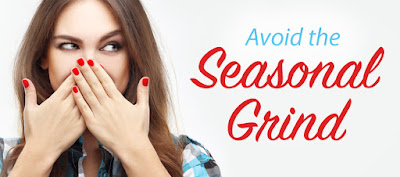Teeth Grinding (Bruxism) and Holiday Stress
Protect Your Teeth From Holiday Stress: Avoid the Seasonal Grind
The holiday season is a time of year that comes with many things: visits from loved ones, weekly parties, a multitude of shopping trips, long hours spent in the kitchen, and stress-induced bruxism. Stress isn’t always a bad thing; in fact it can even be good in small doses. It can spur excitement, joy, and eager anticipation, and it can even function as that extra bit of motivation that you need to get everything on your to-do list done. Even when the outcome of the stress you are experiencing is positive, the effects it has on you physically can be negative.
What Is Bruxism?
The gradual onset of mild to moderate head and neck aches, jaw pain, and sensitive teeth can signal that stress is beginning to take a toll and that you might be suffering from a condition called bruxism. Bruxism is a condition in which you clench and grind your teeth throughout the day and night. The clenching and grinding can become so hard and loud that it can be heard by partners and loved ones within the affected individual’s living space.
Some individuals only suffer from short bouts of bruxism. But if you begin to experience any of the following associated symptoms with regularity, you should call and set up an appointment with our provider immediately.
Signs and symptoms that indicate you could be suffering from bruxism include:
Worn tooth enamel
Face pain rooted at the jawline
Earache-like pain
Headache in the temple area
Sores from chewing or biting the inside of your cheek
Grinding teeth during sleeping hours
If left untreated, bruxism can lead to more serious conditions that may require extensive and expensive care to resolve. These conditions include:
Damaged teeth: Individuals who suffer from bruxism end up clenching and unclenching their teeth all throughout the night. The pressure they put on their jaws can equate to 250 pounds or more worth of force, which can cause extreme wear and tear on teeth. Tooth sensitivity is the least of the repercussions this type of pressure can have on oral health. Chipped, cracked, and severely worn teeth can result, requiring extensive restorative treatments.
TMJ: TMJ is disorder of the temporomandibular joints that causes pain in the jaw, head, and neck areas. It can cause the jaw muscles to spasm and make it difficult for sufferers to open and close their mouths normally. Treatments may include Botox injections, medications that relax muscles, and protective nighttime mouth guards.


Comments
Post a Comment